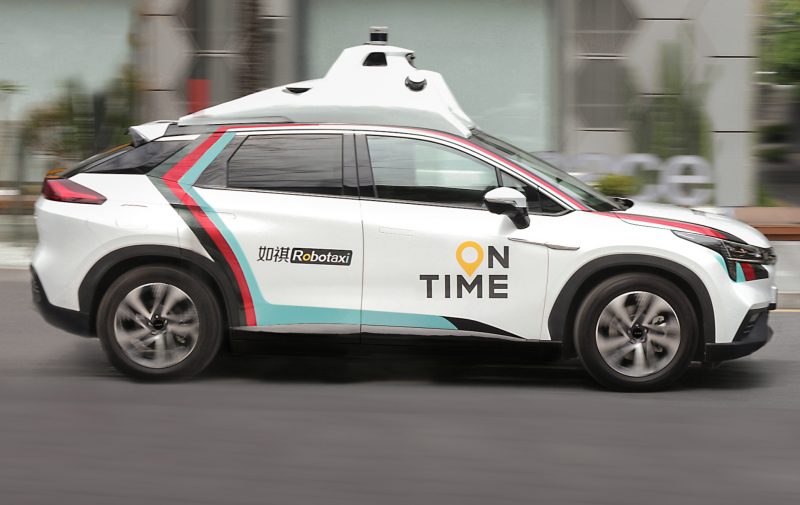Pony.ai to Launch Robotaxis in China With Ontime, the Ride-Hailing App of Automaker GAC Group
【Summary】Autonomous driving technology developer Pony.ai is expanding its presence in China in a new partnership with automaker GAC, which is China’s fifth largest carmaker and a longtime Pony.ai partner. As part of the close collaboration with GAC, Pony.ai will deploy its autonomous vehicles on the automaker’s "Ontime" ride-hailing app. The new collaboration with GAC will help to accelerate the commercialization of autonomous mobility in China.

The race to deploy commercial autonomous vehicles in China is heating up, with dozens of companies working on autonomous mobility solutions. Among the leaders are Pony.ai, which is launching a commercial mobility service called PonyPilot that's similar to Uber using autonomous vehicles.
Now Pony.ai is one step closer to expanding its presence in China as its deepens its partnership with automaker GAC, which is China's fifth biggest automaker and a longtime Pony.ai partner.
As part of the new partnership with GAC, Pony.ai will deploy its autonomous vehicles on the automaker's ride-hailing app Ontime. Pony.ai said its close collaboration with Ontime will help to accelerate the commercialization of autonomous driving technology in China.
Pony.ai will integrate its virtual driver technology into GAC vehicles that will be used for the ride-hailing service, which will charge fares to the public.
Ontime expects to launch its fee-charging robotaxi service in Guangzhou by the end of the year. Initially, the service will launch with a fleet of approximately 100 autonomous Ontime ride-hailing vehicles outfitted with a full suite of autonomous driving technology from Pony.ai.
Pony.ai is also investing in Ontime's Series A financing round as part of the collaboration.
Riders will be able to request one of Pony.ai autonomous vehicles through the Ontime App as well as through Pony.ai's own PonyPilot+ App.

Although Ontime is not a household name outside of China, the company operates one of China's biggest ride-hailing services. Ontime offers a wide range of app-based ride-hailing services across the cities of China's Greater Bay Area, such as Guangzhou, Foshan, Zhuhai, Shenzhen and Dongguan.
"Our deep cooperation with Ontime is key to our strategy of building the autonomous driving ride-hailing ecosystem," said James Peng co-founder and CEO of Pony.ai. "This program with Ontime will start in Nansha, Guangzhou, where we currently operate, with the potential to expand quickly throughout many other regions of China," "This collaboration is a perfect example of Pony.ai's approach to rapid mass commercialization with partners."
In addition to working with Ontime, Pony.ai continues to develop and deploy its own PonyPilot+ robotaxi vehicles.
This partnership with Ontime builds on Pony.ai's April 24 announcement that it is the first and only autonomous driving company to receive a taxi license in China, with a permit to operate 100 autonomous vehicles as traditional taxis on public roads in Nansha, Guangzhou.
Next month, Pony.ai will start charging fares in the entire 803 square kilometers of Nansha with its fleet of 100 Pony.ai robotaxis. The company plans to gradually expand the scale and scope of mobility service to other areas of Guangzhou. The 100 vehicle fleet in Nansha will be separate from and will operate in parallel to the Pony.ai Ontime fleet.
Pony.ai is competing in China with internet search giant Baidu Inc, which is expanding its "Apollo Go" autonomous ride-hailing service in cities across China. Baidu is also adding autonomous vehicles to its Apollo Go ride-hailing app.
Along with Pony.ai, Baidu has also emerged as a leader in the development of autonomous driving technology in China. As a pioneer in China's autonomous driving development, Baidu's Apollo Go autonomous vehicles have accumulated over 10 million test miles on public roads. Like Pony. ai, Baidu also plans to build an entire mobility-as-a-service (MaaS) ecosystem in China.
In February, The Apollo Go robotaxi service expanded to Shenzhen's Nanshan District, providing autonomous robotaxi services to commuters there for the first time. Shenzhen is the seventh city where Baidu launched Apollo Go, following Beijing, Shanghai, Guangzhou, Chongqing, Changsha, and Cangzhou.
Apollo Go uses a similar model Ontime, as well as Uber, Lyft, Motional and Waymo in the U.S. Riders in China use an app to summon a car and wait at a local station for one of the autonomous vehicles to come pick them up.
The Nanshan District has a favorable policy environment for the deployment of self-driving vehicles, as well as a strong road network to support the operations. The area offers optimal conditions for the rapid implementation of robotaxi services and the rapid development of autonomous driving technology on the various platforms, which is viewed as a way to gain a competitive edge.
"For robotaxi service to gain customer acceptance, it must be accessible through a ride-hailing platform. Ontime will launch the first fully open robotaxi operation platform in the domestic ride-hailing industry. By providing a robotaxi commercial operating solution and robotaxi vehicle operating infrastructure, we believe this joint partnership can accelerate the sustainable commercial development of robotaxi service," said Jiang Hua, CEO of Ontime.
Pony.ai secured a $400 million investment from Japan's Toyota Motor Corp in Feb 2020.
For the PonyPilot robotaxi service in China, the company is using a fleet of Toyota Sienna minivans outfitted with autonomous driving technology. In January, Pony.ai announced it developed a complete autonomous driving computing unit built on NVIDIA's powerful Orin system-on-a-chip (SoC) for the Sienna minivans.
The processor is Pony.ai's 6th generation autonomous driving system and is designed for automotive-grade mass production. The first Toyota Sienna vehicles equipped with the system will begin road testing in China later this year.
This powerful autonomous computing unit powered by the NVIDIA DRIVE Orin processor and will rapidly accelerate the roll-out of Level 4 autonomous driving capabilities, according to Pony.ai. SAE Level-4 autonomous vehicles require no human intervention.
The NVIDIA DRIVE Orin SoC achieves 254 TOPS (trillion operations per second) of performance, and includes a comprehensive deep learning accelerator. It delivers the computing power required for advanced AI-powered computer vision processing to support level-3 and higher autonomous driving.
Pony.ai's automotive-grade, high performance autonomous driving processor features low latency and high reliability. The company created an entire product portfolio with multiple configurations using one or more DRIVE Orin processors combined with NVIDIA's automotive-grade Ampere architecture GPUs.
Pony.ai is headquartered in Guangzhou, China, but the company was founded in Fremont, California in 2016 with a goal to build the safest and most reliable autonomous driving technology. In Feb 2020, Pony.ai launched a pilot offering a group of Fremont city employees access to Pony.ai's shared, autonomous last-mile robotaxis.
Pony.ai is one of eight companies, including Waymo, which spun out of Google's self-driving car project, and GM's autonomous driving unit Cruise, that were issued a permit to test their self-driving vehicles on public roads in California without a safety driver on board.
In March, Pony.ai completed its first close on a Series D funding round, which combined with its previous funding, pushed its valuation to $8.5 billion.
The company also closed on a $367 million Series C funding round in Feb 2021, after a $100 million tranche was added to the $267 million Pony.ai raised in Nov 2020.
Addition to working with GAC and Toyota, Pony.ai has also formed a partnership with the FAW Group, which is China's second biggest automaker.
-


Ford is Testing a New Robotic Charging Station to Assist Drivers of EVs With Disabilities
-


Ford Raises the Prices of the F-150 Lightning Electric Pickup Due to Rising Raw Material Costs
-


The BMW 7-Series to Feature HD Live Maps From HERE Technologies for Hands-Free Highway Driving in North America at Speeds up to 80 MPH
-


AutoX to Use the 'Eyeonic Vision Sensor' from California-based SiLC Technologies for its Robotaxi Fleet in China
-


LG Develops ‘Invisible’ Speaker Sound Technology That Could Revolutionize In-Vehicle Audio
-


Researchers at South Korea’s Chung-Ang University Develop a ‘Meta-Reinforcement’ Machine Learning Algorithm for Traffic Lights to Improve Vehicle Throughput
-


Zeekr’s New 009 Electric Passenger Van is the World’s First EV to Feature CATL’s Advanced ‘Qilin’ Battery With a Range of 510 Miles
-


Redwood Materials is Building an Electric Vehicle Battery Recycling Facility in South Carolina
- Panasonic Announces Multi-Year Agreement to Supply Electric Vehicle Batteries to Lucid Group
- Urban Air Mobility Company Backed by Electric Automaker XPeng Inc Begins Trail Production of its Voyager X2 ‘Flying Car’
- Volkswagen’s Software Company CARIAD to Use BlackBerry QNX to Support ADAS and Autonomous Driving Functions of Future VW Vehicles
- GM's New 'Plug And Charge' Feature Will Simplify the Charging Process For its Current & Future EVs
- Biden Administration Announces New Standards to Make EV Chargers More Accessible
- Toyota Unveils the 2023 Crown, a Lifted Hybrid Sedan With 340 HP
- Automakers Urge Consumers to Buy an EV Before Tax Credit Changes
- GM CEO Mary Barra Shares the First Look at the New Chevy Blazer EV Launching in Spring 2023
- Rivian, Mercedes-Benz Partner to Produce Electric Commercial Vans
- Chipmaker AMD to Collaborate with ECARX on a Digital Cockpit, In-Vehicle Computing Platform for Next-Gen EVs











 About Us
About Us Contact Us
Contact Us Careers
Careers